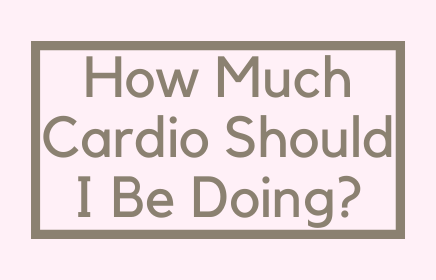Hey guys, Sarah Bowmar here to answer the age-old question. The thing I get asked more than anything on the planet: how much cardio should I be doing to lose weight?
Before I answer this, here are a couple of things to know:
- Cardio is not magical
- Cardio should not be abused and should not act as a form of punishment if you overeat or binge
Let’s start at the beginning …
You burn calories 24/7. Even when you are sleeping. You burn calories while you eat. You burn calories petting your cat (not a lot, but you ARE ALWAYS BURNING CALORIES).
Here are two magical numbers to know when determining how much cardio you should be doing: Your BMR (basal metabolic rate) and TDEE (total daily energy expenditure).
We are all different and so are our BMR and TDEE. Someone who is 5’3, 135lbs, and 15% body fat has a MUCH different BMR than someone who is 5’3, 135lbs, and 35% body fat. The same goes for TDEE because the more muscle you have, the more calories you will burn throughout the day.
There is a multitude of ways to determine these numbers. There are many free online calculators but those are sometimes hit or miss as everyone uses different calculations. At Bowmar Fitness, we also offer some great ways to know and understand your numbers. I’m not saying you have to buy a meal plan from us, but we are certified nutrition professionals, and our meal plans have helped over 12,000 customers. IF you are interested, they are available at https://bowmarfitness.com/nutrition-plans/.
Back to cardio
Your TDEE encompasses your sleeping, eating, moving, breathing, petting of the cats, showering, lifting, and cardio, etc. Every movement. Everything you burn throughout the day. Your BMR is what your body burns at rest, aka laying in bed all day long.
Obviously, these are 2 different numbers. If you’re using our method of calculating your TDEE, you will be asked to determine how many hours of activity you perform throughout the week. If you are a nurse on your feet for hours on end and lift weights, your TDEE activity level number will be vastly different from someone with a desk job who maybe does some walking at lunch.
The amount of cardio you do should be calculated into your TDEE. If you are determining your numbers and you aren’t doing cardio, you might be at 12 active hours per week. So your caloric intake will be based on 12 hours. If you want to start adding in cardio, let’s say four 30 minute sessions a week, your active hours just went from 12 to 14 and your calories will GO UP because you are MOVING MORE.
I try to do cardio 3-4 times a week. The duration depends on my current goal. How much cardio you do is up to you but you need to be logging in and factoring in all of the cardio you are doing.
I personally do 3–4 40 minute sessions a week if I am wanting to cut (I like to eat a lot so I am willing to do more cardio). I do 2–3 15 minute sessions a week if I am wanting to maintain or bulk (to keep my heart and lungs healthy). I would NEVER recommend doing more than 45 minutes of cardio per session. If you do more than 50 minutes, you will put your body in a catabolic state (aka consuming your own muscle for energy). I personally do steady-state cardio because it is easier on my joints. I do incorporate HIIT from time to time in the form of Crossfit.
Please don’t do what I do if you are not eating enough to do what I do.
MOVING MORE = MORE CALORIES BURNED = MORE FAT BURNED
Ok, let’s take a breath.
Ok, back to it.
I ALWAYS RECOMMEND that anyone trying to lose weight should also be weight lifting because the more muscle you have, the more calories you will burn, as it takes more energy to move muscle. The more muscle you have, the higher your BMR will become because it takes more energy to move a 200lb person that is solid muscle compared to a 200lb person that is solid fat (obviously no one is 100% anything).
If you want to lose weight: eat less than you burn aka TDEE.
If you want to maintain weight, eat what you burn aka TDEE.
If you want to “bulk”, eat more than you burn aka TDEE.
A good rule of thumb is to never eat below your BMR.
Specific macros, calories, etc. should not be set in stone either. Adjust. Make changes. Track what your body is doing. We always recommend our clients update their stats every 2 weeks to ensure the most accurate macro and caloric totals for their current bodies.
I hope this helped. Please provide feedback on my Sarah Bowmar Instagram page if it did!
Sarah Bowmar
To get the latest from Sarah Bowmar, check out the Sarah Bowmar homepage to subscribe.












I think you simplified it perfectly!
Loved this! Really helps and gives me a better basis to explain this for others! Thank you!
Couldn’t you provide more information on the benefit of different types of cardio? Low/moderate intensity vs. high intensity and intervals? Additionally, I w heard mixed things on the best time to do cardio (before or after lifting). What do you think?
**could you provide
THANK YOU!!!! I needed this. As a recent gastric bypass patient I am looking to obviously maximize my weight loss so this helps big time
Thanks for directing me here!
I ageee. I am interested too!
What are ur recommendations for post Bariatric surgery cases that want to build muscle. Due to smaller stomach I have limited caloric intake
This information was so helpful! I just love how you know exactly what your body needs!
Thanks for the blogs didn’t even know u had these … very informative.
I really loved how simple this was to understand! Thank you!!!